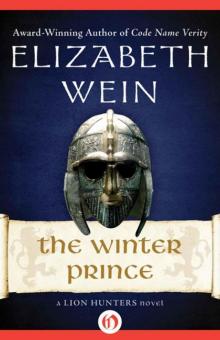- Home
- Elizabeth E. Wein
A Coalition of Lions Page 6
A Coalition of Lions Read online
Page 6
Candake paused for breath, chuckling and wheezing. “Priamos was sick, sick with nerves. After the presentation to Caleb they took the children out to see the animals, and he vomited into the lion pit.”
One of Priamos’s guards was twitching in his attempt to keep a straight face. “Go, go!” Priamos said to them, turning quickly. “Tedla, Ebana, I swear I’ll have you whipped for insolence. Go! I am late.” He drove the guards before him with his arms spread wide, abandoning me to his mother.
“Coward!” I called after him, laughing.
“No coward,” his mother grunted darkly. “He will find little time for idle sport this winter. The bala heg are going to keep him busy.”
Telemakos settled himself comfortably at the grand woman’s feet. He leaned low to the floor and chirruped softly. Three slender cats the color of sand, with faint stripes across their noses and tails, came slinking out from beneath baskets and behind curtains and swarmed over his lap. One of them perched on his shoulder, rubbing its head against his face and purring so violently you could have heard it from across the room.
“You may trust my handmaids, little Sheba,” Candake told me kindly. “Say what you like; who shall repeat it outside this court shall have her tongue cut out.”
She patted Telemakos on top of his head with one of her fat, painted hands. “Isn’t that right, my fox kit?”
He tossed his head. “You don’t scare me,” he said loftily. “And anyway—I’m no telltale.”
They had to say everything two or three times over before I could fully understand it, but I think that is how it went. Candake made me sit at her feet opposite Telemakos. Then, tilting my chin toward her with one thick, emerald-laden finger, the queen of queens demanded: “Tell me, Princess of Britain, have you met my sweet nephew, the good and holy Wazeb, heir to the king of kings? A king-priest shall we have in him, not a bad thing, though his father thinks him a very silly boy. And what think you of our salt-faced regent? Let me touch your hands while we speak, your smooth pale hands. Constantine will not let me near him.”
I thought she had some important things to tell me, implied in her pregnant questions. I let her stroke my hands, fascinated by her.
“Can you explain—” I ventured. “Can you tell me how Constantine came to power here?”
“Through my brother having the temperament of a hyena.” Candake snickered. One of the maids began to feed her pieces of fruit cut into stars and crescents and diamonds. “Why should Caleb work when another can do it for him? Hyena! Caleb sent one after another of my sons into battle, so to avoid losing any more of his own. The day my husband Anbessa died, even before he was lying in his grave, Caleb sent the order that my sons should be released from their sequestering and brought to him to train as his warriors. My brother has emptied his treasury on war and this palace. He looks at his heir and sees that Wazeb chants and dreams of God. Caleb mourns his lost Aryat, and thinks his ravaged kingdom will fall to a son without ambition or ability.
“So Caleb designs to retire to the dragon’s hermitage and let another patch up his empire for him, while Wazeb waits his chance at power. But Wazeb will not grasp and grab at authority. Ha! You watch him. The tame lion. And they think all the lions have gone from the emperor’s palace!” She gave another burst of elephantine laughter.
“So Caleb looks about him for a regent, saying, Which of these attendant insects will suck up the most nourishment for Aksum, before he begins to whine so irritatingly that Wazeb is forced to snatch up the imperial fly whisk? Caleb reviews them all and fixes on the mosquito Constantine. No one else is so strict, so plodding and pedantic. And no one is so dispensable. So they go up to Mai Shum with the bishop, the abuna, and a cloud of priests, and in the reservoir they baptize Constantine again with our own baptism, and so you see him now, the viceroy Ella Amida.”
Candake stopped speaking at last, wheezing.
“So if Constantine fails, the blame is Constantine’s,” I said. “And if he succeeds, the kingdom is Wazeb’s. Whatever happens, no reproof will come to Caleb. It is not so unaccountable as it looks.”
“A princess and a politician!” Candake chuckled. “Bring coffee. Feed some of those to the princess,” she ordered suddenly; and to my consternation, the maid began to put the fruit stars into my mouth.
“How long will Wazeb endure it?” I asked, when I could. “Does he seem likely to snatch up the fly stick?”
“Fly stick!” Candake creased herself laughing again. “Why should he put down his prayer stick? It is good enough for swatting flies, and his British viceroy is bringing order and wealth to the mess his father left behind him. The tame lion will wait and watch.”
Then she screamed for the coffee to be brought.
“Where’s that boy gone?” Candake demanded suddenly. “He likes coffee.”
The cats had slipped silently away, and Telemakos had disappeared after them. I have no idea when it happened. Only the distance of Candake’s enormous knees had separated him from me, but I had never even seen him move. Candake waved a hand dismissively as the coffee things were laid before her.
“He does that all the time, artful young fox. Drives his poor grandfather to the edge of madness. How the child makes me laugh!” Which she did, violently, before lighting her burner. “His mother won’t allow him coffee anyway. Now, my little queen of Sheba, set aside the mosquito Constantine while we drink together.”
“Look what we found in the tax office.”
I was on my way to my appointed meeting with Constantine, but he found me first, in the breezeway that connected Candake’s private wing with the main body of the palace. Constantine came forward with Telemakos at his side, one hand resting on the back of the child’s head. Behind them stood the impassive ceremonial spear bearers. Telemakos was still and serious, more than usually contained. He did not show it in any obvious way, but I was seeing something I had not seen in him before: he was afraid.
“Have the decency to use full grown spies in future,” Constantine told me in a voice of frost.
“I have not yet stooped to spying on you,” I answered in an equal tone.
Telemakos said heatedly, “I would not get caught if she did.” He tilted his head back, suddenly, and winced.
Constantine had hold of his thick hair.
“Queen’s pawn should be played more cautiously than this,” Constantine said, and gave the child’s head such a yank that Telemakos screwed his eyes shut and bared his missing teeth, though he did not make a sound.
“Here,” Constantine said offhandedly, letting go and pushing the child forward with a hard smack to the back of his skull. “See him home. I may still have time for you when you get back.”
It never occurred to me to acknowledge this dismissal, but Telemakos was better trained than I. He knelt before Constantine with his swift, sincere reverence and murmured, “I beg your forgiveness, my lord. I didn’t know you had an appointment in the tax room.”
“The last person caught hiding there was beheaded in the cathedral square,” Constantine said. “It was not my office then, but I have inherited that right along with the room. It would simplify everything if I exercised it. Don’t tempt me.”
He blew past us, saying again in parting, “Take him home.”
Telemakos and I walked through the palace gardens in silence, and through the principal gate, and started down the wide road through the wealthy suburb where Kidane’s mansion lay. Along the way we met the usual salutes from the mutilated dispossessed of the war in Himyar; they waited idly in the lee of stone walls, stood close against the shade trees to avoid the rain, squatted together among the sycamores’ roots to scoop out shallow cups in the damp earth and fill them with pebbles to play gebeta there. When they noticed me, they stood quietly and bowed; a few came limping in my wake. If I had been walking in the city, they would have made a crowd around me. I touched the bow at my shoulders, which I always carried when I went anywhere alone, but I did not string it. No one of the Himy
ar veterans had ever threatened me. I walked quickly, making Telemakos trot to keep pace with me.
“Why did the viceroy call me your pawn?”
We were almost home now. Telemakos was panting.
“Why did he—”
“He could have meant me,” I said shortly. “I’m not queen yet.” We both knew he had not, but Telemakos did not press me. He said instead, still panting as he tried to keep up with me and talk at the same time, “I wasn’t hiding. I was stalking one of Candake’s cats. I’d been following him for an hour, forever, all over the palace, and then he went to sleep in that room. I was waiting for him to wake up. I knew it was the tax office, but truly, I didn’t know the viceroy had a meeting there.”
I slowed my pace to match his more evenly. “What did he do when he found you?”
“One of the spear bearers found me. They search the room before he goes in. They sweep under alt the furniture with their spears, and stick them in the curtains. Stop a minute, look—”
He hitched up his kilt. He had taken a long, shallow scratch up his thigh. No wonder he had been scared.
“It was an accident,” Telemakos said. “Nafas did it. He was very upset.”
I was guilt-stricken for having made Telemakos walk so fast, and my estimation of the emperor’s silent ceremonial guards rose, as well.
I also saw that if they had accidentally killed Telemakos, Constantine would have been blameless. I saw this, and I knew that if it had happened that way, and my cousin had protested his innocence, I would never have believed him. I noted this piece of notional unfairness against Constantine as a mark against my own character. He had never lied to me, after all.
“Telemakos,” I said seriously, “while Constantine is viceroy, don’t run about the New Palace on your own.”
“I’ll be careful.”
“Don’t hide there. Don’t stalk Candake’s cats. Don’t feed Caleb’s monkeys.”
“I play there always!”
“It’s different now. Since Priamos has returned and I am here, the ministers and nobles are all suspicious of him, and me, and Constantine because I am to be married to him, and you because I stay in your house. They will check the wall hangings and palm fronds with spears and daggers. I don’t want you to get hurt again.”
We stood before his grandfather’s gates. “Promise me this, Telemakos.”
He whistled through the gap in his teeth, which he did when he was thinking.
“Can I go through the markets? And the Necropolis, where the monuments are? Can I go anywhere I like, as long as I stay out of the New Palace?”
Something occurred to me: he had said he must beg Kidane to take him to the New Palace.
“Are you usually allowed to go anywhere you like?”
“Not by myself,” Telemakos said.
Suddenly I wanted him out of this. He was too obliviously innocent. If he did not serve me willingly, I would not coerce him, and he was not ready to make such choices himself.
“You can go anywhere you like,” I said, “as long as someone can see you.”
Telemakos answered mournfully, “That’s the part I don’t like. Having to stay where someone can see me. I will soon forget that part.”
“Think about Nafas’s spear,” I told him, “and you’ll not forget.”
We went through the gate together. “Let’s tell your mother,” I added.
CHAPTER VI
The Long Rains
“I WARNED YOU I should be a disagreeable guest,” I uttered in a low voice. Telemakos was in bed, and Turunesh sat spinning in her private sitting room by the brilliant light of a glass oil lamp that hung from the ceiling. My own hands were idle. “I should not have allowed my quarrel with Constantine to come to this.”
“Don’t falter now,” Turunesh said. “Hold Constantine in check. I’ll take Telemakos out of it.” She seemed calm as ever; her busy hands never stopped moving. “The roads are all impassable in winter, but in the new year I’ll bring Telemakos to my father’s country estate in Adwa.”
The Aksumite new year falls in British September. It was July now; their spring was still at least six weeks away. It seemed remote and distant.
“You are too forgiving,” I said, angry at myself.
“They all say that. I make a pet of my son. But he is all I will ever have of his father, and his sweet affection melts my heart.”
“It is battering away at mine, as well. I do not deserve such compassion. I am remorseless as my aunt.”
“You are both kings’ daughters,” Turunesh agreed mildly, as though that excused even the worst excesses of libertine behavior; or indeed, as though it were reason to expect such excesses. She laid her spindle in her lap. “Princess, what other weapon do you have? I cannot condemn you. I would do the same for my kingdom, if I had to.”
“All right, but why should I have to?”
It rained and rained. Even the doves were bad-tempered. It was worse than Britain; the rain came down torrentially, day after day. I slopped back and forth in it almost daily between Kidane’s house and the New Palace, bedraggled men begging at my heels. My only consolation for making this trek was that every now and then I found Priamos left momentarily idle and able to sit and talk with me. I dragged him into the Golden Court to get him out of his room.
We sat on the marble rim of the big fountain, as we had on the morning of my arrival in the city. One of the monkeys crept up to us and climbed into Priamos’s lap. Priamos fondled the elegant black-and-white creature beneath its chin, then suddenly drew taut the monkey’s gold chain with one hand. Priamos said abruptly, “I hate this.”
He shook the links, which rang musically. “I cannot see any reason to keep them if they must be chained. They are supposed to be climbers and leapers.”
“You said that Caleb’s lions were chained.”
“It made me sick to look at them.” Priamos shook the monkey’s lead again, and began to pick idly at the rivet that fastened it into the marble wall. “Mikael was always kept in chains,” he said. “My eldest brother. When I was young, sequestered with Hector and Ityopis and Yared, we thought Mikael a terrible monster. He would shake his chains at us when we came near, just as these monkeys do. He never spoke except to recite scripture or scream for a spear. His ‘serpent-slaying spear,’ he called it. He is named for the saint who founded Debra Damo, and for the angel Michael.”
The marble around the rivet was chipped, and Priamos worried it as he spoke. “Hector once schemed that he should furnish Mikael with a spear, just to see what he would do with it.”
“What did he do with it?” I asked, fascinated.
“Nothing. Which was as well, because Hector was caught and trapped in an empty reservoir with Mikael and his serpent’ slaying spear for half a week.”
Priamos jerked at the monkey’s chain. “I do not think often about Mikael. But I hate to see wild creatures bound. I cannot stomach it.”
I remembered the cowed boy led on board the yacht in Septem, and Priamos’s angry scowl, and the light, sympathetic brush of his gentle hand against mine.
Again he jerked at the golden links, and the fastening came away from the wall, bringing a spall of marble with it.
I laughed. “There, you have freed him.” The elegant monkey still curled against Priamos’s other arm, unaware it had been released.
Priamos set it down on the pool’s rim aside of him, and laughed also. “I wonder if the rest will come away so easily,” he said, and reached over me to pull at the chain on the other side of the bench. It did not.
One of his guards said politely, “Prince, best leave it—”
Priamos stood up, ignoring him. He wrapped the gold links around his hand and gave a ferocious heave, throwing all his weight against the chain. A chunk of marble the size of his fist came out of the fountain wall.
“Hai!”
He snatched at another chain. One guard tried to trip him with the shaft of a spear, and the other lunged for him. He was quicker tha
n either of them. He jumped over the rim, splashed noisily across the fountain, and attacked one of the chains on the opposite side of the stone pool. The guards leaped after him, at once crying for assistance and yelling at him to stop. The monkeys already freed scampered chattering up the columns toward the coffered ceiling; those yet chained began roaring in fear or excitement.
Ityopis tore past me.
“Priamos, be not a fool!”
Priamos was fast. There were half a dozen monkeys loose now, and there were no less than six men trying to pull him down, but Priamos seemed always to be a hairsbreadth ahead of them. Wazeb came wafting into the court as through drawn by the commotion. I could not see over all their heads, and stood on the edge of the fountain.
“Priamos, stop!” I cried in dismay, slipping unhelpfully into Latin. “Oh, God, your hands!” The chains were tearing them to shreds.
Ityopis caught him by one arm and struggled with him, crying out desperately, “Sir, this is madness, madness! You have waited so patiently—”
“I cannot sit here and look at them any longer,” Priamos gasped, gentle Priamos, and wrenched two more monkeys free before his guards and three soldiers and a butler dragged him to the ground.
Seconds later Constantine dragged him up again by a length of his shamma, half choking him. “My God, the waste! The expense!” He struck Priamos viciously across the face. “Do you have any idea what it costs to keep this palace as Caleb ordered it? Or how much was thrown away on that twenty-year debacle in Himyar—”
“Seventeen,” Priamos interrupted hotly. “Seventeen years it went on, not twenty.”
Constantine hit him again.
“Stop this!” I bellowed. “You idiots both—”
“What do you know of Himyar?” Priamos blazed at Caleb’s viceroy, reckless with rebellion and outrage. “What do you know of Abreha? Have you ever been there? Have you ever seen him?”
“I know Himyar,” Constantine said. “I was in Sana last year as Caleb’s envoy, do you not remember? Abreha was so bold as to ask me to stay as his own ambassador! I know the face of treachery when I see it!”

 The Pearl Thief
The Pearl Thief Cobalt Squadron
Cobalt Squadron The Empty Kingdom
The Empty Kingdom Code Name Verity
Code Name Verity Rose Under Fire
Rose Under Fire A Coalition of Lions
A Coalition of Lions Black Dove, White Raven
Black Dove, White Raven The Winter Prince
The Winter Prince The Sunbird
The Sunbird